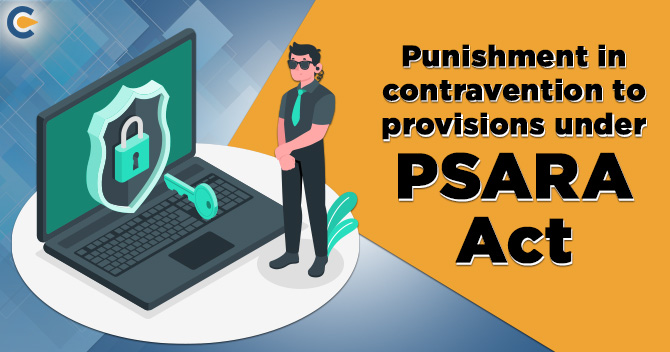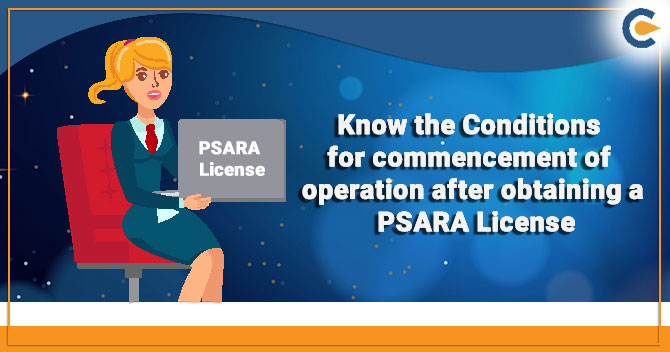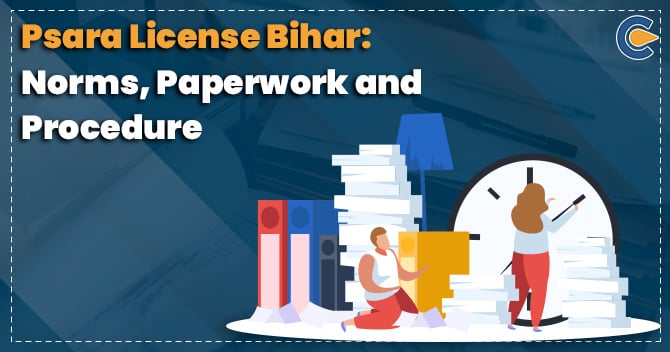With the traditional policing and national security agencies serving the law and order function, there is an increasing uptake of private security agencies for protection of establishment/goods/person. Industry today requires private security to perform functions more than mere guarding services. However on non compliance with the provisions, required punishment under PSARA act is provided.
The Union Minister for Home Affairs had included private security forces as a viable alternative to state forces in his public address requesting state governments to conduct security assessment for nuclear and defense establishments, iconic structures, major religious shrines and key industrial establishments in the private, public as well as joint sector. However, in violation of public security, there are various punishments under PSARA act[1] prescribed for the private security agencies.
Punishment for contravention of certain provisions under PSARA
- Any person who contravenes the provisions of section 4 shall be punishable with imprisonment for a term which may extend to one year, or with fine of not less than ten thousand rupees but which may extend to twenty-five thousand rupees, or with both.
- Any person or private security agency who contravenes the provisions of sections 8, 9, or 11 of the Act, shall be punishable with a fine of not less than five thousand rupees but which may extend to twenty-five thousand rupees, in addition to suspension or cancellation of the PSARA license.


Offenses by companies
- When a punishment under PSARA Act is provided to a company, every person who at the time of commission of the offense was in charge of, and was responsible to, the company for the conduct of the business of the company as well as the company, must be deemed to be guilty of the offence and must be liable to be proceeded against and punished under the Act
- Provided that nothing contained in this sub-section must render any such person liable to any punishment under PSARA if he proves that the offense was committed without his knowledge or that he had exercised all due diligence to prevent the commission of such offense.
- Notwithstanding anything contained in sub-section (1), where any offense under the Act has been committed by a company and it is proved that the offense has been committed with the consent or involvement of, or is attributable to, any neglect on the part of any director, manager, secretary or other officers of the company, such director, manager, secretary or other officers shall be deemed to be guilty of that offense and must be liable to be proceeded against and punishment under PSARA is given accordingly.
Note: For the purposes of this section:-


Offenses to be punishable by trial
Offences have punishment under PSARA Act must be tried by a Judicial Magistrate of the First Class having jurisdiction in the place where the offense is committed.
Offenses to be cognizable
Every offence have punishment under PSARA Act must be cognizable within the meaning of the Code of Criminal Procedure.
Previous sanction of the Controlling Authority necessary in certain cases
No prosecution must be instituted against any person in respect of offenses under sections 4, 8, 9, and 21, without the previous sanction of the Controlling Authority.
Read our article: PSARA License: Renewal and Penalties
Indemnity Punishment under PSARA
No suit, prosecution or other legal proceedings shall lie against the controlling authority or any other officer authorized by it in respect of anything done or intended to be done in good faith under the Act.
Punishment under PSARA
- With the passage of time, PSAs have evolved into corporate entities with operational offices in every state or specific site akin to manufacturing companies that would own one or more production units/factories in distinct states. As a normal practice, such state-wise or project-wise units and their day to day affairs are managed by a manager/person-in-charge who reports to the Chief Executive Officer or the Board of Directors, as the case may be.
- The existing form of the Act and rules there under hold the Directors directly responsible for any act/omission on the part of a guard or guards while rendering private security services. In such scenarios, the concerned director/CEO is also summoned by the respective controlling authority.
- The above scenario presents a very difficult situation, discouraging organized professionals/corporate to enter in the private security sector. Although it is important to affix responsibility of the overall functioning of the PSA and its compliance with the license conditions to the directors/CEO, the Act should follow a graded approach by incorporating the ‘occupier’ concept.
- Accepted in recent legislations dealing with industries having pan India operations and facilities in various states, this concept entails holding the person-in-charge of the facility as the first point of contact for the authorities and also the person primarily responsible for compliance with the statute.
- Upon the failure of appointment of such person-in-charge (which may be mandated to be notified to the authority concerned), the directors/CEO would be held responsible. Such a framework would not only inculcate better compliance ethos within the respective state/site offices of the PSAs but also allow better enforcement for the regulatory authorities.
- Therefore, it is recommended that the Act and Rules be amended to incorporate an ‘occupier’ concept whereby the person-in-charge of the PSA facility for a state/project is primarily liable for any violations and the directors/CEO can be prosecuted upon failure to nominate such person-in-charge or on serious offenses/violations.
Graded Penalty System
- Consistent with the modern enforcement practices, it is recommended that the Act is amended to adopt a graded approach while prescribing penalties for offenses. The current framework of the Act and the Rules do not allow enforcement agencies or PSAs to compound offenses and adopts an archaic/old approach towards penalties. A compounding provision would allow regulators to be flexible in case(s) of minuet, very technical, or first-time offenses.
- Additionally, provisions relating to issuance of improvement notice and suspension of license for non-compliance may be incorporated to aid better enforcement. If any PSA does not adhere to the compliance conditions specified within the improvement or suspension notice, as the case may be, then the regulator may proceed to cancel/revoke the license.
- It has been observed that providing for some time-period to incur compliance enables efficient enforcement while avoiding time and cost-intensive litigation. Affording such clauses within the Act and the Rules would allow for the industry to gear-up for true self-regulation and improvise on compliance pitfalls.
- It is recommended that the existing framework under the Act is revised to hold the person-in-charge for operations in a particular state/project office primarily responsible for any violations. All service/process in connection with such violations should also involve such person as the first point of contact.
- The board or CEO should only be summoned in cases of serious breaches or in the absence of any such person-in-charge being nominated by the PSA. The Act requires allowing for compounding of offenses, at the discretion of the regulator, for minuet, very technical, or first-time offenses.
- Provisions relating to issuance of improvement notice and suspension of license for non-compliance may be incorporated to aid better enforcement. The regulator may proceed to cancel/revoke the license if the PSA does not satisfy compliance even after the said notices.
Conclusion
The deployment of converging security services, i.e. manned guarding along with technical equipment has an ever-increasing uptake. Advanced security assessment techniques and expertise gained by foreign security services would allow for provision of efficient services to the clients. It would also be imprudent to equate security services with sensitive sectors like defense or other critical sectors affecting the economy such as insurance/banking/financial services. In order to maintain adequate checks and balances, the Government can mandate prior-approval for investment beyond a certain threshold in PSAs.
Read our article:Private Security Agency cannot engage Guard without License













